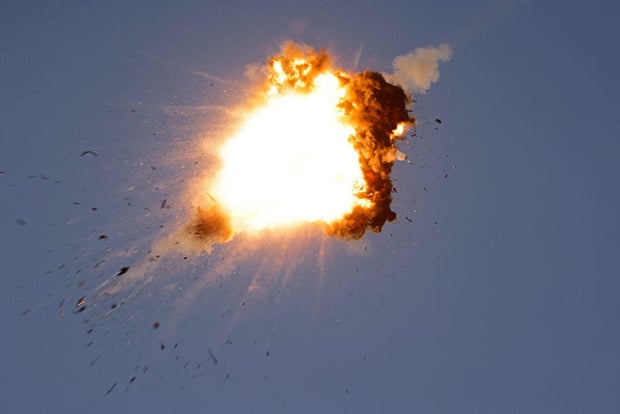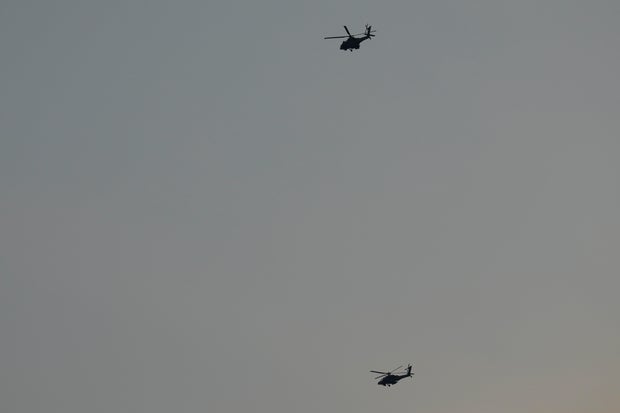Israel launched a series of intense airstrikes in southern Lebanon early Sunday in what it described as a pre-emptive move against the Hezbollah militant group, threatening to trigger a broader regionwide war that could torpedo efforts to forge a cease-fire in Gaza.
Soon after, Hezbollah announced early Sunday that it had launched its own attack on Israel with a large number of drones. The Iranian-backed group has been promising for weeks to retaliate for Israel’s assassination of a top commander late last month.
“We have conducted precise strikes in Lebanon in order to thwart an imminent threat against the citizens of Israel,” Israeli Defense Minister Yoav Gallant said in a statement. “We are closely following developments in Beirut, and we are determined to use all the means at our disposal in order to defend our citizens.”
JALAA MAREY/AFP via Getty Images
Israel’s military spokesman, Rear Adm. Daniel Hagari, said in a briefing that “dozens of IAF jets are currently striking targets in various locations in southern Lebanon.”
Hezbollah said its attack involved more than 320 Katyusha rockets aimed at multiple sites in Israel and a “large number” of drones. It said the operation was targeting “a qualitative Israeli military target that will be announced later” as well as “enemy sites and barracks and Iron Dome (missile defense) platforms.” It said the strikes were an initial response to the killing of Fuad Shukr, a top commander with the group.
The Israel Airports Authority reported that it briefly suspended flights in and out of Ben Gurion International Airport, while flights that were already en route to Ben Gurion were diverted to other airports. It said flights resumed at 7 a.m. local time.
Last week, Gallant said he was moving more troops toward the Lebanese border in anticipation of possible fighting with the Iranian-backed group. Hagari said early Sunday that “in a self-defense act to remove these threats, the (Israeli military) is striking terror targets in Lebanon, from which Hezbollah was planning to launch their attacks on Israeli civilians.”
Ariel Schalit / AP
“We can see that Hezbollah is preparing to launch an extensive attack on Israel, while endangering the Lebanese civilians,” he added, without providing details. “We warn the civilians located in the areas where Hezbollah is operating to move out of harm’s way immediately for their own safety.”
Lebanese media reported strikes in the country’s south without immediately providing more details. Social media footage showed what appeared to be strikes in southern Lebanon.
The office of Israeli Prime Minister Benjamin Netanyahu posted photos of Netanyahu and Gallant overseeing the operation from the Kirya military base in Tel Aviv. Netanyahu’s Security Cabinet was set to meet later Sunday morning.
A National Security Council spokesperson told CBS News early Sunday that President Biden, who is vacationing with his family in Southern California, is “closely monitoring events in Israel and Lebanon” and “has been engaged with his national security team throughout the evening.”
Gallant’s office also said in a statement that he had issued a 48-hour emergency declaration that would enable Israel Defense Forces “to issue instructions to the citizens of Israel, including limiting gatherings and closing sites where it may be relevant.” The IDF also said that it was imposing “partial restrictions” in certain areas, including portions of Galilee and the Golan Heights.
Gallant spoke by phone with U.S. Defense Secretary Lloyd Austin to brief him on the strikes, both a Pentagon spokesperson and Gallant’s office confirmed.
The attacks come as delegations from the U.S., Israel, Qatar and Egypt are holding another round of cease-fire talks in Cairo. A Hamas delegation was also expected to be in Cairo, but senior Hamas official Mahmoud Merdawy stressed to the Associated Press that the group will not take part directly in the Sunday’s talks, but instead will be briefed by Egypt and Qatar.
Fears have been high in recent weeks that the Israel-Hamas war in the Gaza Strip could escalate into a regional conflict after the Israeli strike which killed Hezbollah’s Fuad Shukr, and a suspected Israeli assassination operation in Iran killed Hamas leader Ismail Haniyeh.
Earlier this month, White House national security spokesperson John Kirby said the U.S. was preparing for a possible attack by Iran and its proxies in retaliation for those assassinations.
The USS Abraham Lincoln, an aircraft carrier equipped with F-35 fighter jets, and the USS Georgia, a guided missile submarine, were recently deployed to the Middle East in response.























Discussion about this post